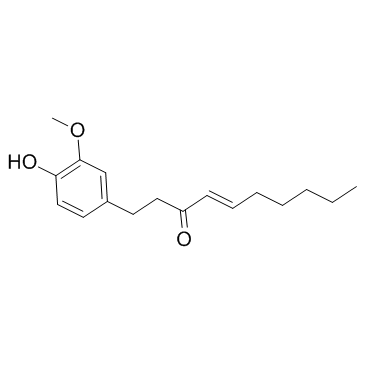Protection by [6]-shogaol against lipopolysaccharide-induced toxicity in murine astrocytes is related to production of brain-derived neurotrophic factor.
Sehwan Shim, Sokho Kim, Young-Bae Kwon, Jungkee Kwon
文献索引:Food Chem. Toxicol. 50(3-4) , 597-602, (2012)
全文:HTML全文
摘要
[6]-Shogaol has beneficial effects in spinal neuronal regeneration, but associated molecules and mechanisms are not identified. Neurotrophic factors, including brain-derived neurotrophic factor (BDNF), are associated with proliferation and differentiation of neuronal cells and exert a neuroprotective effect in neurodegenerative models. We investigated whether treatment with [6]-shogaol increases BDNF expression in lipopolysaccharide (LPS)-treated astrocytes, and examined the effect of [6]-shogaol on neuronal protection. [6]-Shogaol significantly attenuated the cell death induced by LPS. Western blotting showed that [6]-shogaol treatment reduced Bax expression and increased B-cell lymphoma (Bcl)-2 and BclxL expression in LPS-treated cells, consistent with the effects of BDNF treatment. Furthermore, K252a, a blocker of neurotrophic factors, attenuated the cellular protective effects of [6]-shogaol and BDNF. This study provides the first evidence that [6]-shogaol increases the expression of BDNF in LPS-treated astrocytes. Furthermore, these experimental results indicate that production of BDNF in astrocytes might be related to altered cell viability following [6]-shogaol treatment. Thus, the neuroprotective effects of [6]-shogaol is mediated by up-regulation of BDNF.Copyright © 2011 Elsevier Ltd. All rights reserved.
相关化合物
| 结构式 | 名称/CAS号 | 分子式 | 全部文献 |
|---|---|---|---|
 |
6-姜烯酚
CAS:555-66-8 |
C17H24O3 |
|
Update on the chemopreventive effects of ginger and its phyt...
2011-07-01 [Crit. Rev. Food Sci. Nutr 51(6) , 499-523, (2011)] |
|
In vitro antioxidant and anti-inflammatory activities of 1-d...
2012-11-15 [Food Chem. 135(2) , 332-7, (2012)] |
|
6-Shogaol inhibits breast and colon cancer cell proliferatio...
2013-08-09 [Cancer Lett. 336(1) , 127-39, (2013)] |
|
Effects of [6]-shogaol on cholinergic signaling in HT22 cell...
2012-05-01 [Food Chem. Toxicol. 50(5) , 1454-9, (2012)] |
|
Effects of ginger constituents on the gastrointestinal tract...
2011-07-01 [Planta Med. 77(10) , 973-8, (2011)] |